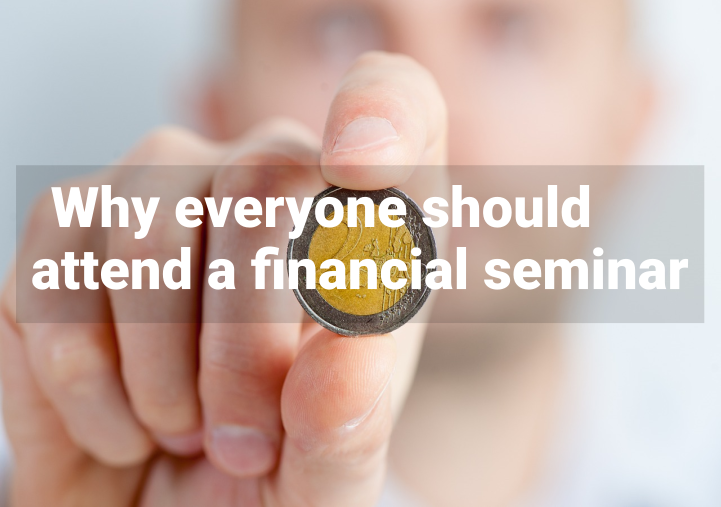Everyone Attend Financial Seminar

When someone invites you for either a free financial seminar or a one-on-one talk about financial planning, say yes. It’s the one class that’s not offered in college. Read on to find out the seven reasons why you should attend.
1. It is free.
Almost all of the seminars I have had the privilege of attending were free. There were some sessions that required buying a workbook, but the lessons I walked away with more than paid off what it cost.
There is nothing to lose.

And sometimes, you might even be offered free snacks or a free meal. You might even win some prizes.
2. It can possibly be life-changing.
Actually, it changes the way you look at money. And then it changes your life.
I’m not talking about a cosmic, earth-shattering change that’s short of spiritual. Rather, a financial seminar makes you realize that no matter what you think about money, life is tied with it. Being free of debts, sending your kids to a good school, having insurance for sickness and death, improving the quality of life, having the chance to travel–these things come with a price tag.
It can make you realize that, because the role of money in life is encompassing, we should be at least good at managing it. Again, the goal is less about getting rich and more on enriching the life you already have.
3. It can help you kick-start your own financial plan.
Remember the many New Year’s resolution to save, only to end the year with zero balance on your account? This can be the push that you are waiting for.
It can can help you understand the reason why you should save, how it is properly done, and where it is going to be parked. For example, you would understand the portion of your income set aside for emergency fund and for investing. It can then provide a guide on the right products that suit your needs
It can also put everything into context, such as helping you come up with your own financial goals.
4. It makes you understand basic economics.
It is cool to understand finally some of the things that were yawned at in college. Some of the best ones I attended talked about inflation and provided real-life examples. One of the remarkable sessions I had was when the speaker showed pictures of a shopping cart filled with household items worth a thousand pesos. Over the years, the number of items for P1,000-budget has dwindled.
It was a powerful message.
I mean, at that point, I knew what inflation was but only as a concept. Throughout the session, I realize that while inflation is real and unstoppable there is something that can be done. The same goes for concepts like compound interest, future value of money, estate planning and securities.
5. It is a great chance to meet new people.
Some of the people that left positive impact on me I met in a financial seminar. I got to hear their stories, learn from their struggles and be inspired of their breakthroughs. It is an opportunity to build your own network.
6. It is a good start to learn about financial products.
It can introduce to a range of products that you might find important in your life.
According to 2014 study of Bangko Sentral ng Pilipinas, about 86% of Pinoy households don’t have bank accounts. And that’s really sad. A bank account is a gateway to other financial products such as insurance, time deposits, managed funds and loan, which might turn out to be good
7. It is a great place to learn about investing.
Not a lot of people are given the opportunity to learn how to make money work for you. Financial seminars are a great venue to know about stocks, bonds, and stock market. You can also have the chance to know about financial products such as pre-need options, financial vehicles that are invested in defensive assets, among others.
Some important things to consider
There are some things that you need to remember.
Companies will, in a way, create and deliver a financial seminar that highlights their product.
There is no free lunch, as they say.
The sessions you might be fortunate to attend might be delivered in a way that makes the sponsoring company’s products sound necessary and appealing. While this is actually not bad at all, this might lead you to make on-the-spot decision that’s not for your best interest.
For example, I attended a stock trading seminar. And to my surprise, there was no mention about the risks involved in trading directly on Philippine Stocks Exchange, and how owning direct shares compares to investing in other ways such as in a managed fund or other forms of assets. Instead, everyone was urged to open an online account right away at a discount.
What I suggest that you do, as I did, is to
- have an open mind, but maintain critical thinking.
- attend as many seminars as you can so you can see the difference.
- not just buy because you trust your advisor; buy because you need the product.
- read a book about personal finance. Ernst and Young has fifth-edition book on the subject that’s free to download on your mobile phone.
- step back a little if you only hear the advantages of a product. Think of the inherent risks that were not mentioned.
Don’t decide on concepts alone
Concepts are great, but ultimately you will have to decide on what’s best for you. If someone tells you to buy term insurance because it’s cheap, think about what you are giving up. You will not be covered when you turn 70 years old, which is rather odd because that’s the time of your life that you need insurance the most.
Again, everything boils down to what really fits you the best. Take into account your lifestyle, your saving habit, your personal loans and others.
Show gratitude
Companies that sponsor events like this are motivated to not only educate, but to build a brand. If you walked away from a session learning a lot of things, you may show you’re grateful by posting about it on social media or spreading the news through word-of-mouth. Again, you are in no way obliged to do this. Just letting you know that as a facilitator myself, it’s great to know that you’re doing your bit to help us on our advocacy for financial literacy.



